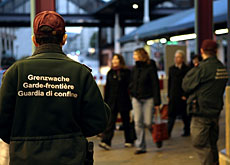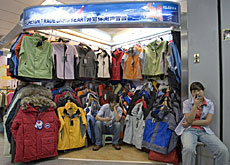Record number of arrests made at Swiss borders

Switzerland's border security faced its busiest year ever in 2006, making nearly 49,000 arrests, an increase of nearly a third.
To avoid a further overload of its services, the Swiss customs administration is negotiating an accord with the European Union to counter unwanted consequences of measures taken to counter terrorism.
The customs department says that nowadays that its work isn’t just about protecting domestic trade, but that it serves as a major cog in national security.
In 2006, revenue from customs duties only represented just over SFr1 billion of the department’s nearly SFr22 billion in revenue. Value-added tax accounted for SFr11 billion, while levies on fuel, tobacco and other sources made up the rest.
The number of arrests made by the department’s border guards increased substantially last year, with the armed service apprehending a third more people than in 2005.
More than 12,000 of these arrests were made on the basis of outstanding warrants, for non-payment of fines, murder or armed theft for example. Around 22,000 people – up from approximately 13,500 in 2005 – were also handed over to the police because they were suspected of criminal activities.
Another 8,100 were taken into custody for contravening traffic laws, while 300 people were arrested for working illegally in Switzerland.
The number of people caught attempting to enter Switzerland or living there illegally rose slightly to 5,858, with over half the cases in the country’s western border region, especially in the Geneva area.
Seizures of counterfeit goods, mostly copies of luxury goods, were down last year. Around two thirds came from Asia, with china accounting 40 per cent of the haul.
The customs service also seized fewer illicit drugs. While its officers were able to get their hands on more cocaine and heroin shipments, they intercepted less cannabis and fewer psychotropic substances.
Notification procedure
The Swiss will have another problem to deal with this year, as the European Union introduces new measures against terrorism at its borders. The customs service fears these measures could slow down the processing of merchandise and people and create a logjam.
The EU has announced a system similar to the one deployed by the United States, which demands notification of a shipment from a third-party country at least 24 hours in advance.
The aim is to avoid the arrival of drugs as well as chemical or nuclear weapons on American soil.
The Swiss, who want to avoid a backlog at the border, will have to reach a special agreement with EU for this year. Further discussions should take place from this spring, with a permanent accord becoming effective in 2009.
swissinfo with agencies
The Swiss border guards are the armed service of the federal customs administration, a department of the finance ministry.
There are approximately 2,000 border guards, including 100 women. They work at 91 fixed locations and in 35 mobile units along Switzerland’s 1,881 kilometres of borders.
Their main tasks are fighting illegal immigration, cross-border crime and contraband, but they also deal with counterfeiting and the smuggling of weapons, plants and animals.

In compliance with the JTI standards
More: SWI swissinfo.ch certified by the Journalism Trust Initiative













You can find an overview of ongoing debates with our journalists here . Please join us!
If you want to start a conversation about a topic raised in this article or want to report factual errors, email us at english@swissinfo.ch.